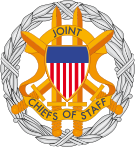
Earl Edward Anderson was a U.S. Marine four-star general. He was the youngest active duty Marine ever promoted to the rank of general and the first active duty Marine Naval Aviator to be promoted to a 4-star rank. He became Assistant Commandant of the Marine Corps on April 1, 1972. He was promoted to general on March 31, 1972. General Keith B. McCutcheon had been promoted to four-star rank the day of his retirement for medical reasons on July 1, 1971. During his 35-year Marine career, he served in combat actions in World War II, the Korean War, and the Vietnam War.

Keith Barr McCutcheon was a highly decorated Marine Corps four-star general and aviator seeing combat in World War II, the Korean War, and the Vietnam War. He earned the Distinguished Flying Cross and ten Air Medals.

General Walter Eugene Boomer is a retired American four-star general and assistant commandant of the United States Marine Corps and business executive. Boomer led all Marines in Operations Desert Shield and Desert Storm during the Gulf War. He was later the chairman and CEO of Rogers Corporation and retired in 2004. He is the current lead director of Baxter International. Boomer is a 1960 graduate of Duke University and later earned a master's degree from American University.

William D. Catto is a United States Marine Corps major general who is the chief of staff of the United States European Command. He assumed the post in July 2006, becoming the first U.S. Marine to hold the role. Catto has served over 10 years in command assignments at the lieutenant colonel, colonel, brigadier general, and major general ranks.
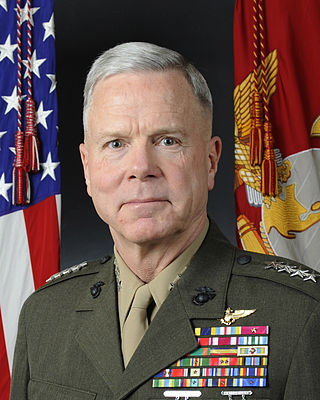
James F. "Jim" Amos is a retired United States Marine Corps four-star general who served as the 35th commandant of the Marine Corps. As a naval aviator, Amos commanded the 3rd Marine Aircraft Wing during the Iraq War in 2003 and 2006. He served as the 31st assistant commandant of the Marine Corps from 2008 to 2010, and was the first Marine Corps aviator to serve as commandant. He retired from the Marine Corps in December 2014.
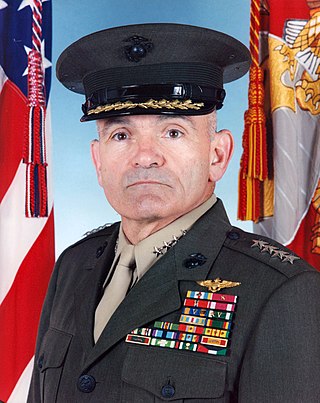
Michael J. Williams is a retired United States Marine Corps 4-star general. He served as Assistant Commandant of the Marine Corps from 2000 until his retirement in 2002.

William Gay Thrash was a United States Marine Corps three-star general and highly decorated Naval Aviator. He retired from active duty on June 30, 1972, after more than 30 years of distinguished service.

Carl B. Jensen is a retired United States Marine Corps general officer whose last command was Marine Corps Installations East. Jensen retired from active duty on July 22, 2011 after 36 years of service.
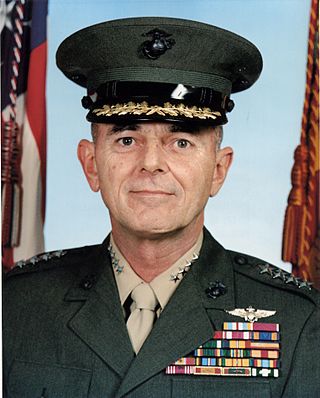
General Thomas Rowland Morgan served as Assistant Commandant of the United States Marine Corps from June 1986 until he retired on July 1, 1988, after completion of more than 36 years of active service.

Frank Libutti is a retired United States Marine Corps Lieutenant General who also served as the head of the New York City Police Department's Counter Terrorism Bureau, Deputy Police Commissioner, and oversaw the Department of Homeland Security's intelligence operations as Undersecretary for Information Analysis and Infrastructure Protection. Libutti's military career included time spent in Vietnam, Japan, Korea, Kenya and Somalia among assignments within the United States during which he oversaw more than 80,000 Marines.

Terrence Rex Dake is a retired United States Marine Corps four-star general who served as Assistant Commandant of the Marine Corps (ACMC) from 1998 to 2000.

Richard C. Mangrum was a United States Marine Corps lieutenant general who served as Assistant Commandant of the Marine Corps from 1965 to 1967. Mangrum was a Marine Corps aviator who was awarded the Navy Cross and the Distinguished Flying Cross for his actions during the Guadalcanal Campaign in World War II.

Eugene R. Brady (1928-2011) was a United States Marine Corps officer and naval aviator who was the recipient of the Navy Cross and a later Silver Star for his heroic actions during two separate medevac missions taking wounded Marines from a landing zone while under fire during the Vietnam War. At the time of these awards, he was serving as the commanding officer of HMM-364, The Purple Foxes. He began his career as a fixed wing pilot and saw service in the Korean War with VMF-311. He did not transition to flying helicopters until 1968. During the course of his career he commanded four different squadrons, Marine Corps Air Station Tustin and Marine Aircraft Group 16. Colonel Brady retired from the Marine Corps in 1980 after more than 34 years of service.

Gregg A. Sturdevant is a retired United States Marine Corps Major General. At the time of his retirement, he was the Director of Strategic Planning and Policy (J5) for U.S. Pacific Command. From February 2012 to February 2013, he commanded the Third Marine Aircraft Wing (Forward), which included U.S. Marine Corps aviation assets then located at Camp Leatherneck / Camp Bastion in Afghanistan.
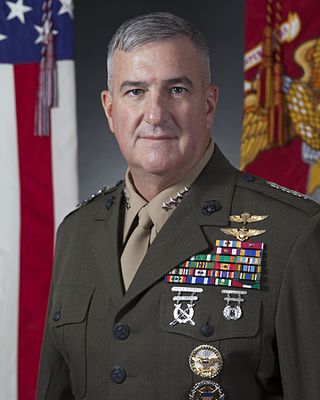
Glenn Michael Walters is a retired United States Marine Corps General, who served as the 34th Assistant Commandant of the Marine Corps from 2016 to 2018. He was appointed as the 20th President of his alma mater, The Citadel, on April 12, 2018.

Edward Steve Fris was a lieutenant general in the United States Marine Corps. He served as the Director of Aviation, Headquarters Marine Corps and is considered a pioneer in the development of today's Marine Air Command and Control System (MACCS).

John W. Bullard Jr. is a retired U.S. Marine brigadier general who served as the commander of the 11th Marine Expeditionary Unit and Commanding General, Marine Corps Installations West - Marine Corps Base Camp Pendleton.

Steven R. Rudder is a retired United States Marine Corps lieutenant general and Naval Aviator. Rudder has served as Deputy Commandant for Aviation, USMC and Commanding General, United States Marine Corps Forces, Pacific.

George Shepard Bowman Jr. was a decorated officer and Naval aviator in the United States Marine Corps. A veteran of three wars, Bowman distinguished himself several times as commander, Marine Aircraft Group 12 in Korea and later rose through the ranks to major general and commander of 2nd Marine Aircraft Wing.
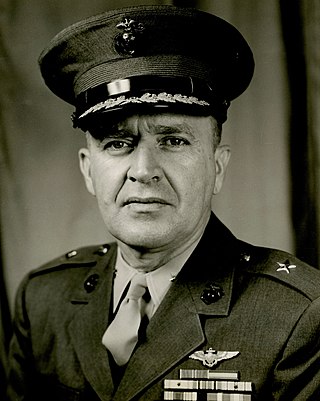
Roy Lewis Kline was a decorated naval aviator in the United States Marine Corps with the rank of brigadier general. A veteran of World War II, he distinguished himself as assistant air officer on the staff of Tenth Army during the Battle of Okinawa. Kline later served as Military Secretary to the Commandant of the Marine Corps, General Randolph M. Pate from 1958 to 1960.


